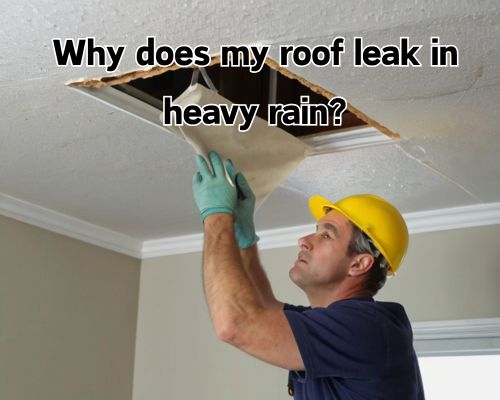
Why Does My Roof Leak in Heavy Rain? Common Causes & Solutions in West Palm Beach, Florida
Why Does My Roof Leak in Heavy Rain? Common Causes & Solutions in West Palm Beach, Florida
A leaking roof during heavy rain is a common issue that many homeowners in West Palm Beach, Florida, face. Given the region’s tropical climate, characterized by frequent storms and high humidity, roofing issues can become more pronounced over time. If you’re wondering, “Why does my roof leak in heavy rain?”, with David Spade of Star Roofing. this article will explore the primary causes, local factors affecting roofing, and solutions to keep your home protected.

Common Causes of Roof Leaks During Heavy Rain
1. Damaged or Missing Shingles
West Palm Beach homes are exposed to strong winds and heavy rain, which can loosen or tear off shingles. Asphalt shingles, one of the most common roofing materials in the area, can deteriorate faster due to UV exposure and salty air, making them more vulnerable to leaks.
2. Compromised Flashing
Flashing is the material used to seal joints and seams on the roof, especially around chimneys, skylights, and vents. If the flashing is cracked, corroded, or improperly installed, water can seep through during heavy rain, leading to leaks inside your home.
3. Clogged or Poorly Installed Gutters
With frequent storms in Palm Beach County, debris, leaves, and dirt can clog gutters, preventing proper drainage. When water backs up, it can seep under shingles or into the fascia boards, causing leaks.
4. Cracked Roof Vent Booting
Roof vents help regulate attic temperature, but if the rubber boot around these vents cracks or deteriorates, rainwater can easily enter the home. This is a common issue in humid climates like West Palm Beach, where rubber materials wear down faster.
5. Improper Roof Installation
Poor workmanship or cutting corners during a roof installation can result in weak spots where leaks develop. If your home was recently built or re-roofed but is experiencing issues, improper installation may be the cause.
6. Condensation in the Attic
West Palm Beach’s high humidity can lead to condensation buildup in poorly ventilated attics. This moisture can mimic the signs of a leak, creating water stains and mold issues that worsen over time.
7. Aging Roof
The lifespan of a roof varies by material. Asphalt shingles typically last 20–25 years, while metal roofs can last over 50 years. If your roof is near the end of its lifespan, materials weaken, and leaks become more common.
How West Palm Beach’s Climate Affects Roof Longevity
West Palm Beach experiences hot summers, heavy rain, hurricanes, and strong winds, all of which take a toll on roofing materials. Salt air from the coast accelerates corrosion on metal components, while high humidity speeds up material degradation. Homeowners must be proactive in maintaining their roofs to withstand Florida’s extreme weather conditions.
Preventive Measures to Avoid Roof Leaks
1. Schedule Regular Roof Inspections
Professional inspections every 6–12 months can catch small issues before they become major problems. A licensed West Palm Beach roofing contractor like Star Roofing can identify damaged shingles, deteriorating flashing, and other vulnerabilities.
2. Keep Gutters and Downspouts Clean
Regularly clearing debris from gutters prevents water buildup that can lead to leaks. Consider installing gutter guards to reduce maintenance and improve water drainage.
3. Ensure Proper Attic Ventilation
Installing proper attic ventilation prevents condensation buildup, which can lead to mold growth and water damage. Ridge vents, soffit vents, and attic fans help regulate moisture levels in the humid Florida climate.
4. Repair or Replace Damaged Shingles Promptly
If you notice curling, cracked, or missing shingles, have them repaired immediately. Small damages can quickly worsen during storm season.
5. Seal Flashing and Roof Penetrations
Applying a waterproof sealant to flashing, vents, and skylights provides an extra layer of protection against leaks. Use high-quality, weather-resistant materials that can withstand Florida’s harsh conditions.
6. Choose Weather-Resistant Roofing Materials
When replacing your roof, opt for materials suited to West Palm Beach’s climate. Metal roofing, clay tiles, and high-wind-rated asphalt shingles offer better durability against storms and hurricanes.
When to Call a Roofing Professional
If your roof has persistent leaks despite regular maintenance, it’s best to call a local roofing expert in West Palm Beach. Look for a contractor who specializes in storm-resistant roofing systems and has experience dealing with Florida’s weather challenges.
Signs You Need Immediate Roof Repair:
- Water stains on ceilings or walls
- Dripping water during or after rainstorms
- Mold or mildew growth in the attic
- Sagging roof sections
- Increasing energy bills due to poor insulation
Conclusion
Understanding why your roof leaks in heavy rain is the first step toward protecting your home in West Palm Beach, Florida. The combination of heavy rain, strong winds, and high humidity makes regular roof maintenance essential. By identifying issues early and using durable materials, you can extend your roof’s lifespan and avoid costly repairs. If you notice any warning signs, don’t wait—contact a local roofing professional to keep your home safe and dry year-round.
Need Professional Roof Repairs in West Palm Beach?
If you suspect a leak, reach out to a trusted West Palm Beach roofing contractor today for an inspection and expert solutions tailored to Florida’s unique climate.